5 Ways the Coronavirus Pandemic Will Create Site Selection Opportunities
by King White, on Mar 24, 2020 3:24:53 PM
I wrote a blog on this topic less than 6 months ago when one-in-three economist said there was a chance that the U.S. economy was headed into recession in 2020. None of them predicted it would happen as fast and be a severe as what the coronavirus pandemic has created. This "black swan" event completely came out of left field and is leaving all of us in a state of panic. The big questions you need to be asking yourself include: how long will it last, how severe will it be, and what impact will it have on corporate site selection strategies. To help you develop your site selection strategy, we identified the following five ways the recession from the coronavirus pandemic could be a good thing if you are considering any type of site selection or location decisions in the near future.
1. Labor markets will soften
It is very clear that virtually all employers have been struggling to find workers. As the unemployment rate has sunk to 3.5% in February, the Coronavirus Recession could provide a much needed reprieve as employers continue to struggle to find and retain talent. The economy is at full employment so this means employers are basically having to poach workers from other employers which drives up wages and attrition rates. With the unemployment rate conservatively projected to jump to over 4% in March and more aggressively predicted to reach over 20%, labor markets will soften. From a site selection perspective, this could open up opportunities for companies to reconsider labor markets that became too tight and were eliminated during the site selection filtering process. The following table shows the historic unemployment through prior recessions:
Historic Unemployment (1980-2019)
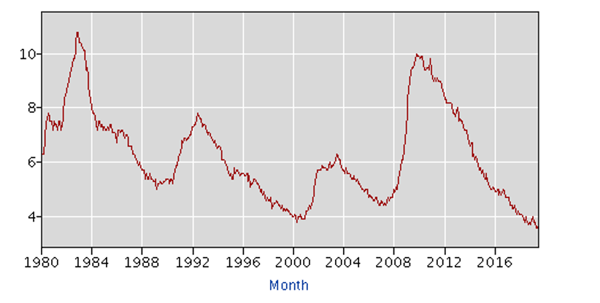
Source: Bureau of Labor Statistics
2. More favorable real estate conditions
The commercial real estate markets have gone through a significant uptrend over the last decade. As a result, real estate and construction costs are at all-time highs while vacancy rates, especially for quality office and industrial, are at lows. Finding quality office and industrial product has become a real challenge for companies and has caused many cities to be eliminated during the site selection process. The coronavirus pandemic will create new options as companies close down sites and potentially cause rental rates to decline. The following diagram shows how vacancy rates should begin to trend upward while demand slows down.
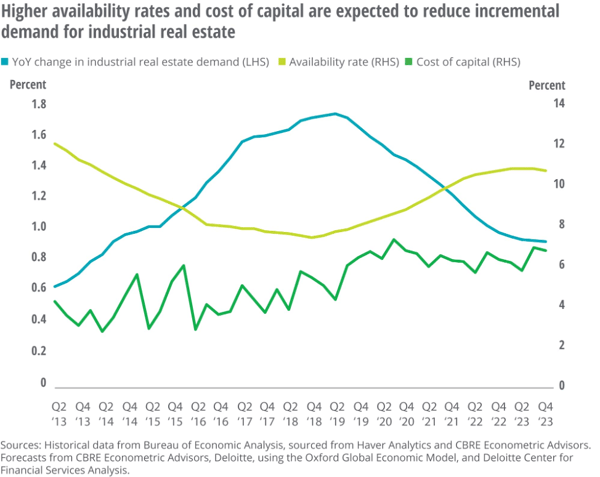
3. Corporate consolidation
Since 1985, more than 325,000 mergers and acquisitions deals have been announced in the U.S. In 2017, a new record was broken with over 15,000 deals announced. The coronavirus pandemic will likely see mergers slow down and corporate consolidation begin as companies will look to reduce expenses. These consolidations will typically occur in operations such as manufacturing plants, call centers, distribution centers and other corporate operations. To help determine where to consolidate and downsize, corporations will implement site selection studies to tell them which locations to keep and which ones to shut down. As a result, there will be cities that are winners and cities that are losers which can create opportunities for others to come in and backfill these locations. The following graph shows merger activity through previous recessions:
Mergers & Acquisitions United States of America
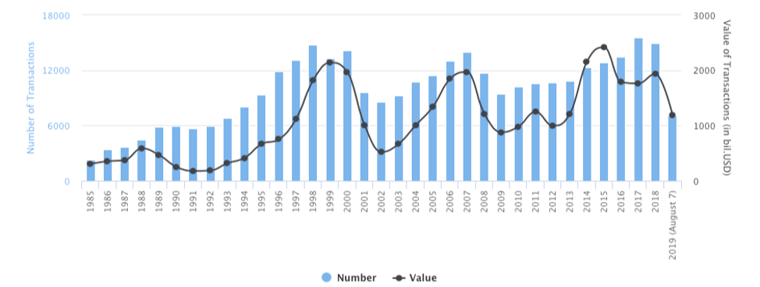
Source: IMAA analysis: imaa-institute.org
4. Lower interest rates
The Federal Reserve just announced it would cut interest rates a full percentage point, in addition to a $700 billion quantitative easing program. This will reverse the trend of rising interest rates and means good news for companies and consumers. Companies will have access to even cheaper capital which could spur some capital expenditures and possible site selection projects especially for capital intensive projects like manufacturing plants and data centers. While consumers could go back to the well for mortgage refinancing which would free up expendable cash to buy goods and services. The consumer impact on site selection trends could hit several areas including call centers doing refinancing to distribution centers shipping products out to consumers. The following interactive chart with the daily 1-year Treasury yield back to 1962 shows how the rate has changed during recessions in the past:
54-Year History Treasury Note Rate
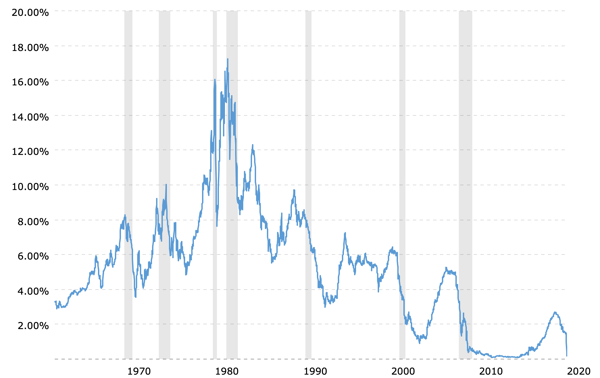
Source: Macrotrends
5. Flushing out startups
The frenzy of private equity money over the last five years has created what has come to be known as the “Unicorn Club.” These are startups that have rapidly grown to be valued at $1 billion or more. These high-growth companies include market leaders like Uber, WeWork, Instagram and Lyft as well as companies that crashed quickly like Theranos. The Coronavirus Recession could deflate some of these companies, which have been hiring a lot of workers and leasing a lot of office space. It shouldn’t be as bloody as the dotcom recession but it could definitely be troublesome for the job market as well as economic development organizations that gave these firms economic incentives such as cash grants, tax credits and tax abatements. The following illustration summarizes the rise of these Unicorns.
The Increasingly Crowded Unicorn Club
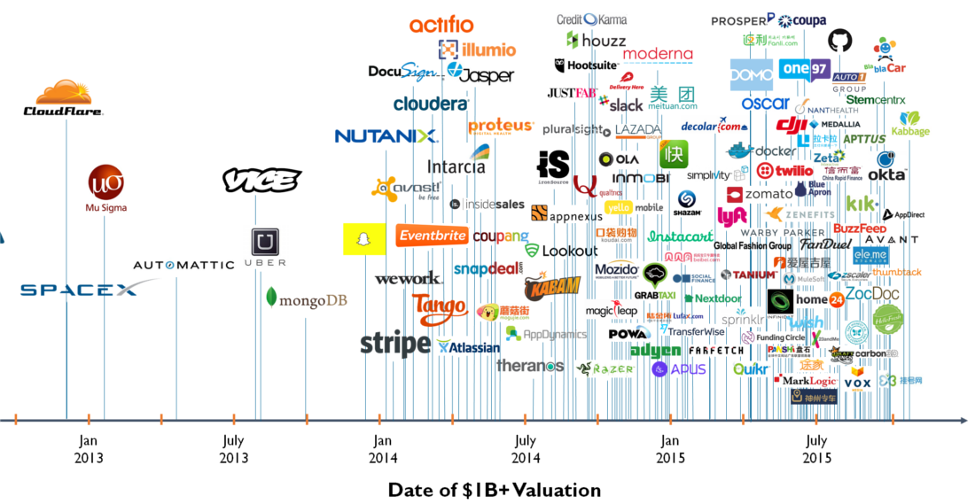
Source: Visual Capitalist
Conclusions
The coronavirus pandemic will definitely change a company’s site selection strategy as it is faced with many challenges including mergers, consolidation and the need to control costs. However, this recession can be seen as positive because it will soften labor and real estate conditions as well as create opportunities for companies that are still growing during this recessionary time. Overall, it is critical that companies are prepare for the changing economic climate and figure out what their site selection strategies needs to be as we battle the coronavirus pandemic.
